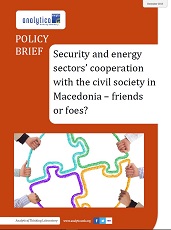Security and energy sectors’ cooperation with the civil society in Macedonia – friends or foes?
Security and energy sectors’ cooperation with the civil society in Macedonia – friends or foes?
Author(s): Ana Stojilovska, Magdalena Lembovska
Subject(s): Civil Society, Environmental and Energy policy, Government/Political systems, Security and defense, EU-Approach / EU-Accession / EU-Development, Corruption - Transparency - Anti-Corruption
Published by: Аналитика Тинк-тенк Организација
Keywords: state institutions; civil society; EU accession; Macedonia; energy and security sector;
Summary/Abstract: The cooperation between civil society and state institutions is an important segment of the reforms the candidate countries have to undertake in order to comply with the EU accession criteria. Moreover, it is one of the crucial corrective roles civil society plays in democracies. The Republic of Macedonia, a candidate country for EU membership since 2005, has undertaken a number of reforms to improve its dialogue and cooperation with civil society. In this line, the Government created a Strategy for cooperation of the Government with the civil society in 2007, succeeded by a new Strategy in 2012. However, experience shows that the implementation varies from ministry to ministry. Having in mind the capital-intensive profile of the energy sector and the legacy of the previous system applying to the security sector, both sectors do not have a tradition of transparency and openness. They also play an essential role in the country’s national security. All of that is considered to be a justification for decisions to take place behind closed doors. Therefore, these sectors prove not to engage themselves actively into cooperation with civil society.
Series: ANALYTICA - Policy Briefs
- Page Count: 18
- Publication Year: 2013
- Language: English
- Content File-PDF
- Introduction

